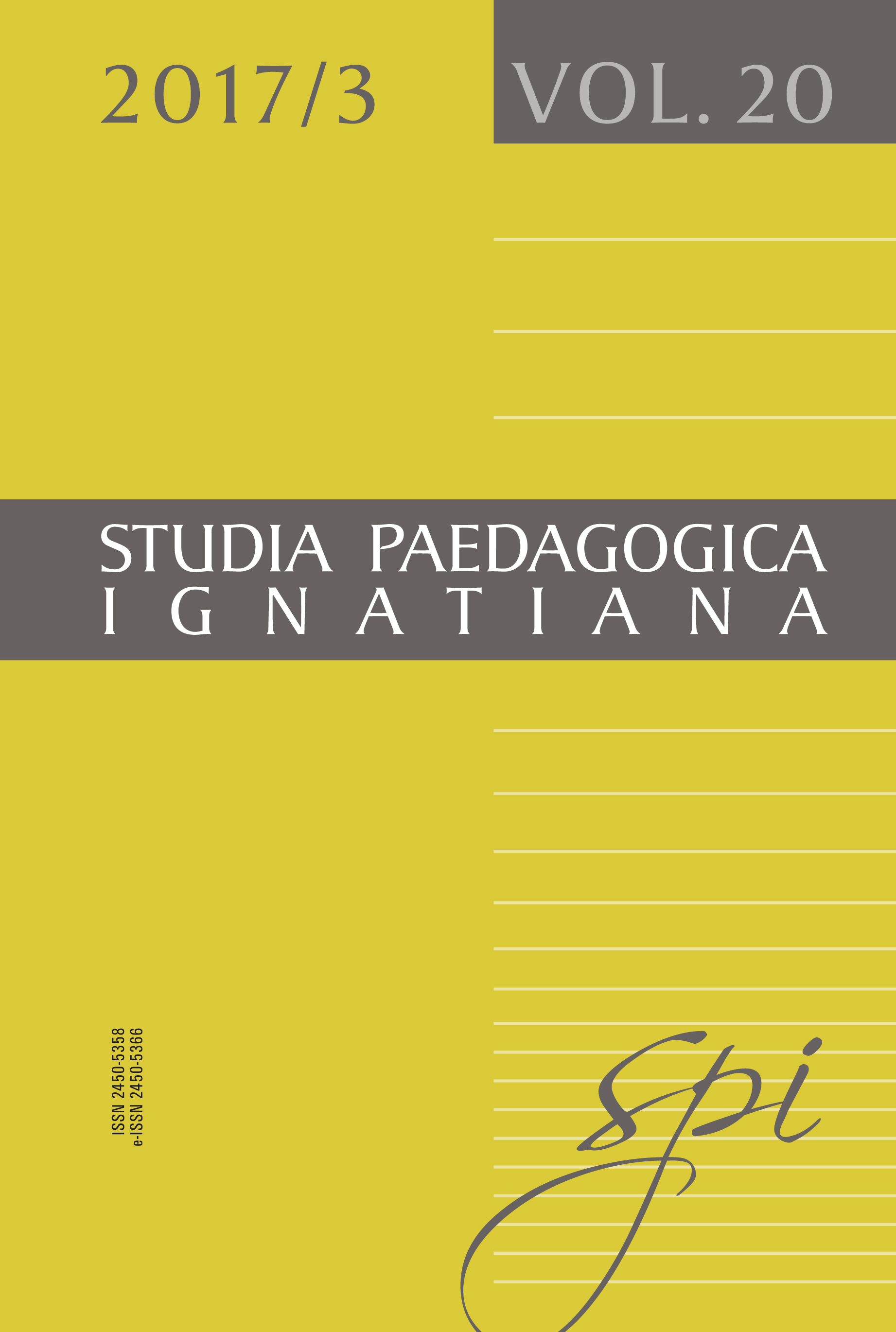The Teacher in Regard to the Openness of the Students in the Educational Space
DOI:
https://doi.org/10.12775/SPI.2017.3.007Keywords
openness, teacher, student, interpersonal relationships, education spaceAbstract
The school is an important space, acting on acquiring experience for students and it is shaped by professional teachers. They attempt to create a friendly place, where a significant role is played by interpersonal relationships. In normal contacts between the teacher and the students, the aspect of openness is very important. It is based on the natural exchange of information between the interlocutors in everyday relations. It allows them to discover new areas of communication. The features of openness are bilateral and reciprocity. Recognizing the importance of openness in the shaping of the educational space, research has been made on the perception of future teachers in terms of the issue of openness in relation to the student. The study was attended by students of UMCS in Lublin from two faculties: English and mathematics. The results of the research presented in the article show that future teachers largely understand the importance of openness. They notice its value in relationships with other teachers, students and the class community. They have problems in refraining from judging and giving advice when transferring information. The most difficult part for them is focusing on content related to specific behaviors. The positive aspect is that the students pay attention to the role of non-verbal communication. Future mathematicians more frequently emphasized that the proper conduct of the teacher can help to shape the openness of the students, because otherwise they may have difficulty in fostering contacts. Students are aware that the extension of their own openness is positive in terms of their development and enriches relationships with students.
References
Adler R.B., Rosenfeld L.B., Proctor II R.F., Relacje interpersonalne. Proces porozumiewania się, przeł. G. Skoczylas, Dom Wydawniczy Rebis, Poznań 2007.
Bochno E., Rozmowa jako metoda oddziaływania wychowawczego, Oficyna Wydawnicza „Impuls”, Kraków 2004.
McKay M., Davis M., Fanning P., Sztuka skutecznego porozumiewania się, przeł. A. Błaż, Gdańskie Wydawnictwo Psychologiczne, Gdańsk 2007.
Edwards C.H., Dyscyplina i kierowanie klasą, przeł. M. Bogdanowicz, Wydawnictwo Naukowe PWN, Warszawa 2006.
Gołębniak B.D. Nabywanie kompetencji do refleksyjnego nauczania, w: Uczenie metodą projektów, red. B.D. Gołębniak, Wydawnictwa Szkolne i Profesjonalne, Warszawa 2002, s. 10-28.
Johnson D.W., Podaj dłoń, przeł. B. Czarnecka, Polskie Towarzystwo Psychologiczne, Warszawa 1992.
Kowalik S. (red.), Psychologia ucznia i nauczyciela, Wydawnictwo Naukowe PWN, Warszawa 2011.
Kwaśnica R., Dwie racjonalności. Od filozofii sensu ku pedagogice ogólnej, Wydawnictwo Naukowe Dolnośląskiej Szkoły Wyższej Edukacji TWP we Wrocławiu, Wrocław 2007.
Kwaśnica R., Wprowadzenie do myślenia o nauczycielu, w: Pedagogika, red. Z. Kwieciński, B. Śliwerski, Wydawnictwo Naukowe PWN, Warszawa 2006, s. 298–303.
Kwiatkowska H., Pedeutologia, Wydawnictwa Akademickie i Profesjonalne, Warszawa 2008.
Mendel M., Przekraczanie progu szkoły jako „rite de passage”, w: Pedagogika miejsca, red. M. Mendel, Wydawnictwo Naukowe Dolnośląskiej Szkoły Wyższej Edukacji TWP we Wrocławiu, Wrocław 2006, s. 180–188.
Nalaskowski A., Przestrzenie i miejsca szkoły, Oficyna Wydawnicza „Impuls”, Kraków 2002.
Niebrzydowski L., Płaszczyński E., Przyjaźń i otwartość w stosunkach międzyludzkich, PWN, Warszawa 1989.
Strumska-Cylwik L., Pomiędzy otwartością i zamknięciem, Oficyna Wydawnicza „Impuls”, Kraków 2005.
TuanY.-F., Przestrzeń i miejsce, przeł. A. Morawińska, Państwowy Instytut Wydawniczy, Warszawa 1987.
Wolicki M., Otwartość osoby ludzkiej. Interpretacja filozoficzna, Papieski Wydział Teologiczny we Wrocławiu, Wrocław 2005.
Downloads
Published
How to Cite
Issue
Section
License
By submitting an article, the author declares that:
they are the author of the article (hereinafter referred to as the Work) and:
- is entitled to exclusive and unlimited copyright to the Work,
- is entitled to dispose of the copyrights to the Work.
The Author grants the Jesuit University Ignatianum in Cracow a free, non-exclusive, territorially unlimited license to use the Work in the following fields of exploitation:
- publishing the Work in paper, digital or magnetic form;
- multiplying the work by any method, without limiting the number of editions or copies;
- distribution of the work and its copies in any form, including marketing, sales, lending, and lease;
- placing the work in a computer memory;
- distribution of the work in information networks, including the Internet;
- public performance, exhibition, display, reproduction, broadcasting and re-broadcasting, as well as making the Work available to the public in such a manner that everyone could have access to it at a time and place chosen by themselves;
- within the scope of dependent rights to the Work, covering, in particular, the right to make necessary changes to the Work, resulting from editorial and methodical preparation, as well as to make translations of the Work into other languages.
The license right shall be transferred the moment of transfer of the Work to the Jesuit University Ignatianum in Cracow. The Jesuit University Ignatianum in Cracow is entitled to grant sub-licenses to the Work in terms of the right granted. The license shall be limited in time for a period of 15 years from the date it is granted.
Stats
Number of views and downloads: 736
Number of citations: 0



